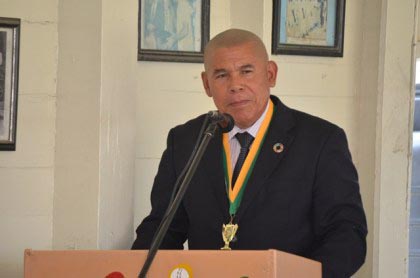In keeping with the Anti-Money Laundering and Countering the Financing of Terrorism (AML/CFT) legislation, the National Assembly on Friday night approved the appointment of the nominees for the posts of accountant and attorney for the Financial Intelligence Unit (FIU), though the parliamentary opposition declared its non-support for the latter candidate because of alleged political affiliations.
The appointments of Surendra Lall Boodhoo as accountant and Yonette Romao-Scarville as attorney come after lengthy selection and confirmation processes.
The search for the accountant had commenced in December, 2015 and Boodhoo was identified in March last year by the National Assembly’s Committee on Appointments.
Chairman of the Committee and Minister of Social Cohesion Dr. George Norton explained that Boodhoo was selected from a shortlist based on applications in response to public advertisements. Norton said ten applicants were shortlisted and summoned before the committee for interviews. “The committee conducted a preliminary interview of nine persons since one of the persons was absent from the interview,” he said, before adding that the committee later arrived at a candidate but that person declined the position.
The House was told that the Committee subsequently shortlisted two applicants; one indicated non-interest, resulting in the other applicant, Boodhoo, being selected. Subsequent to his selection, due diligence was exercised by the police commissioner, who provided no information to suggest that Boodhoo had been of interest to the police in the past.
Committee member Juan Edghill lamented the protracted process, which he said started since December 23rd, 2015. “Two years and months to find an accountant for the [FIU] and even after the committee would have agreed and would have interviewed and had the assurance of this candidate we found to be suitable, based upon a process. I don’t know if this House expects professional people to wait from April of one year, having applied and been successful, to fill a vacancy sometime after January the following year… we have to find a way of doing this better because if we don’t we will participate in a zero sum process,” he said.
Edghill emphasised that the parliamentary opposition fully endorsed the candidate but wanted to lament the fact that his appointment has taken too long. “I do hope that we can still engage the services of the gentleman for this job,” he said.
Meanwhile, with respect to the adoption of the committee’s Fifth Report, which dealt with the selection of the attorney, Norton explained that after public advertisements, the committee acknowledged the applications of two candidates. At a meeting held on June 22nd, 2016, the committee interviewed those persons and acknowledged that neither of those applicants possessed the requirements outlined in the advertisement and as a result the position was re-advertised with some adjustments made to the number of years of experience. Norton added that assistance was then sought from the Guyana Bar Association and the Guyana Associa-tion of Women Lawyers to urge those in the profession to apply. As a result, 10 persons applied but one was found to be politically exposed was disqualified. Five applicants were invited to appear before the committee for interviews but one withdrew her application, he said. Following the interviews, there were differences in opinion among the committee members. The four opposition members, he explained, proposed a candidate while the government members selected another candidate. At a meeting held on April 5th, 2017, he said the committee agreed that Romao-Scarville will be selected.
He said that the candidate was contacted and she indicated her interest in the position and subsequently a due diligence process was conducted by the police.
Opposition Chief Whip and committee member Gail Teixeira stated that the committee’s report on the attorney’s selection details the difference in views on the process. Informing that there were a number of issues that the opposition needed to “flag,” she stressed that there was a difficulty in finding an attorney and that it was only after the appeal that the committee got a fair amount of applicants.
According to Teixeira, “We have to make sure that persons working under the FIU and the Authority are not politically-exposed persons [PEPs].” She said that the Director of the FIU did contact the committee to see how fast the two positions could be filled. As a result, she said there was “some pressure” on the committee to get the report before the National Assembly for approval.
“The difference of views were primarily based on the interview and our waiting system … [and] on the issue of whether the candidates were ‘PEPs’ or not and in the view of the opposition the person who has been selected is a PEP and, therefore, we cannot support the candidate that has been recommended,” she said.






